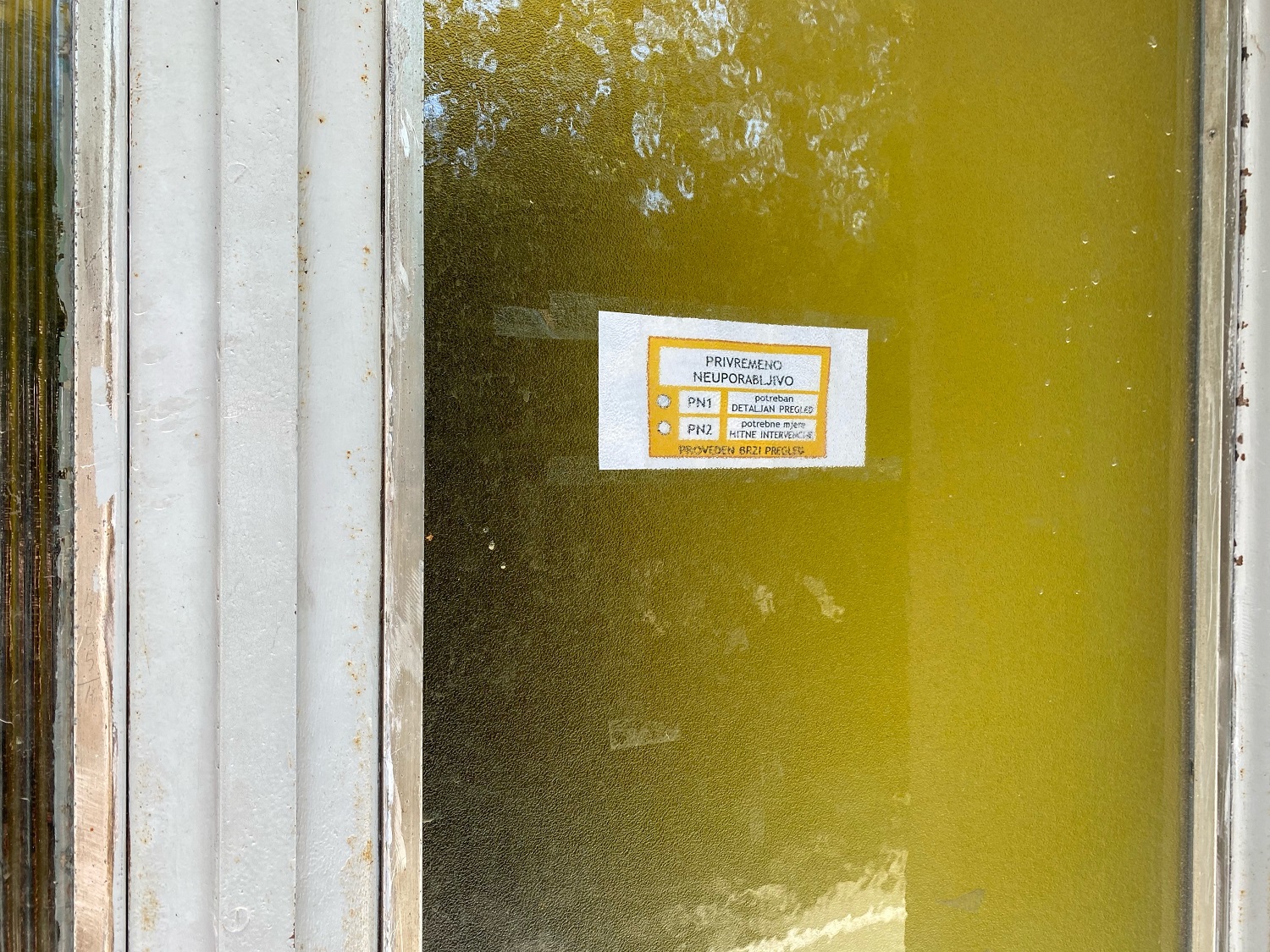Privremeno neuporabljivo
Bila bi to jedna sasvim obična nedjelja na pragu proljeća da buđenje nije bilo tako silovito. Naime, 22. ožujka nešto prije pola sedam ujutro probudila me nevjerojatna buka, a zidovi oko mene mahnito su se ljuljali. U prvi mah nisam shvaćala što se događa, no ubrzo sam se razbudila – potres!
Toga su se jutra stanovnici glavnog grada Hrvatske probudili uz potres kakav Zagreb nije vidio od kraja 19. stoljeća. Grad se tresao na 5,5 stupnjeva po Richteru i iako smo i moja zgrada i ja prošle nedirnuto, centar grada i područje oko epicentra potresa na istočnim obroncima Medvednice itekako su stradali. U samom centru grada bilo je nažalost i ljudskih žrtvi – poginula je petnaestogodišnja djevojka.
Da stvar bude gora, sve se to odvilo usred pandemije koronavirusa, pa je izlazak ljudi iz kuća i okupljanje na otvorenom sa sobom donijelo strah od mogućeg širenja zaraze i porasta broja oboljelih. Srećom, to se nije dogodilo.
Četiri mjeseca nakon potresa, dok hodam gradom, na zgradama u centru još uvijek stoje zelene, žute i crvene naljepnice – zgrade pogođene potresom pregledavali su nakon potresa statičari i sukladno njihovoj uporabljivosti dodjeljivali im naljepnice: zelenu („uporabljivo“), žutu („privremeno neuporabljivo“) i crvenu („neuporabljivo“). Mnogi ljudi ostali su bez doma i još uvijek su u privremenom smještaju.
Pandemija koronavirusa i dalje je u tijeku i u Hrvatskoj uzima sve veći psihički danak (a da ne spominjem da je u posljednjih mjesec dana i broj oboljelih u porastu). Nesigurnost je u zraku, mnogi su već izgubili posao, mnogi se za posao boje, egzistencija ljudi je ugrožena i većina se ljudi osjeća bespomoćno. Privremeno neuporabljivo, mogli bismo reći.
Dok frustracija ljudi u novonastaloj zdravstvenoj, ljudskoj i ekonomskoj krizi buja, sve je veći broj onih koji koronavirus odbacuju kao veliku zavjeru i ništa posebnije od virusa gripe. Kao nekome tko radi u javnozdravstvenoj ustanovi (kao prevoditeljica i voditeljica ureda) perspektiva mi je možda drugačija nego kod ljudi koji sve to promatraju „izvana“ i nemam dojam da se nešto „skriva“. No nelagoda je ista. Sve nas prati osjećaj da nemamo kontrolu nad vlastitim životom. Nitko se ne voli osjećati neuporabljivo, pa makar i privremeno. Tko će se naposljetku iz svega izvući sa crvenom, a tko sa zelenom naljepnicom, pokazat će vrijeme.
Vorübergehend außer Betrieb
Es hätte ein ganz gewöhnlicher Sonntag im beginnenden Frühling werden können, wäre das Erwachen nicht so brutal gewesen. Am 22. März nämlich, kurz vor halb sieben Uhr früh, weckte mich ein ohrenbetäubender Lärm, die Wände um mich herum wankten wie verrückt. Zunächst begriff ich gar nicht, was geschah, dann aber kam ich jäh zu mir – ein Erdbeben!
An jenem Morgen wurden die Einwohner der kroatischen Hauptstadt von einem Erdbeben geweckt, wie es Zagreb seit dem Ende des 19. Jahrhunderts nicht mehr erlebt hatte. Die Stadt bebte bei Stärke 5,5 auf der Richterskala, und obwohl mein Wohnhaus und ich dieses unbeschadet überstanden, erlitten das Stadtzentrum und die Bereiche rund um das Epizentrum an den östlichen Hängen des Berges Medvednica durchaus schwere Schäden. In der Innenstadt waren leider auch Opfer zu beklagen – ein fünfzehnjähriges Mädchen kam ums Leben.
All dies geschah, was die Sache nur noch schlimmer machte, inmitten der Coronavirus-Pandemie, weshalb das Verlassen der Häuser und das Versammeln im Freien mit der Angst vor einer möglichen Ausbreitung der Infektion und dem Anstieg der Zahl von Erkrankten einhergingen. Dies blieb jedoch glücklicherweise aus.
Vier Monate nach dem Beben gehe ich durch die Stadt und sehe an den Gebäuden im Zentrum immer noch grüne, gelbe und rote Aufkleber – die vom Erdbeben betroffenen Bauten wurden von Statikern begutachtet und je nach Betriebssicherheit mit Aufklebern versehen: grün („in Betrieb“), gelb („vorübergehend außer Betrieb“) und rot („außer Betrieb“). Viele Menschen verloren ihr Obdach und befinden sich noch immer in Notunterkünften.
Die Coronavirus-Pandemie hält weiterhin an und fordert in Kroatien einen immer höheren psychischen Tribut (vom Anstieg der Fallzahlen im letzten Monat ganz zu schweigen). Unsicherheit liegt in der Luft, viele haben ihre Arbeit bereits verloren, viele fürchten um ihre Arbeitsstelle, die Existenz der Menschen ist bedroht, ein Großteil von ihnen fühlt sich hilflos. Vorübergehend außer Betrieb, könnte man sagen.
Während die Frustration der Menschen in der neu entstandenen gesundheitlichen, sozialen und wirtschaftlichen Krise ins Kraut schießt, wächst die Zahl jener, die das Coronavirus als große Verschwörung und gewöhnliches Grippevirus abtun. Als jemand, der in einer Einrichtung des öffentlichen Gesundheitswesens arbeitet (als Übersetzerin und Büroleiterin), habe ich vielleicht eine etwas andere Sichtweise als jene, die all das „von außen“ betrachten, weshalb ich überhaupt nicht den Eindruck habe, hier würde etwas „verheimlicht“. Doch das Unbehagen ist das Gleiche. Wir alle werden vom Gefühl heimgesucht, keine Kontrolle mehr über das eigene Leben zu haben. Niemand wird gerne außer Betrieb gesetzt, noch nicht einmal vorübergehend. Wer von uns dann letzten Endes mit einem roten und wer mit einem grünen Aufkleber davonkommen wird, wird sich zeigen.
Übersetzung: Elvira Veselinovic
Temporarily Out of Order
It would have been an ordinary Sunday in early spring had the morning wake-up call not been so rough. On March 22, just before half past six in the morning, I was awakened by a terrible noise, and the walls around me were swaying wildly. At first, I didn’t understand what was happening, but soon it became clear to me – an earthquake!
That morning, the citizens of the Croatian capital Zagreb were awoken by a strong earthquake, the likes of which the city had not experienced since the end of the 19th century. The city was shaken by an earthquake of magnitude 5.5 and although my home and I didn’t suffer any damage, the city center and the area around the earthquake’s epicenter on the eastern slopes of the Medvednica Mountain were severely damaged. Sadly, the earthquake took a death toll of one – a fifteen-year-old girl was killed in the city center.
To make matters worse, it all took place amidst the coronavirus pandemic, so people running from their homes and gathering out in the open caused fear of a possible spread of the coronavirus infection and an increase in the number of the coronavirus cases. Fortunately, that did not happen.
Four months after the earthquake, as I walk around the city, the buildings around the city center still have green, yellow and red stickers attached to them – the buildings were inspected by structural engineers after the earthquake and marked with stickers according to their usability: green (‘in order’), yellow (‘temporarily out of order’) and red (‘out of order’). Many people became homeless and are now living in temporary accommodation.
The coronavirus pandemic is still in progress and taking an increasing psychological toll (not to mention that the number of cases has been on the rise for the past month or so). Insecurity is in the air, many have already lost their jobs, many fear for their jobs, people’s livelihoods are threatened, and most people feel helpless. Temporarily out of order, one might say.
During this current human, economic and health crisis the frustration of the people is growing constantly, and with it the number of those who say coronavirus is just a big conspiracy and not more dangerous than regular flu. As someone who works in a public health institution (as translator and office manager), my perspective may be different from that of the people ‘on the outside, looking in’, and I do not feel that things are being ‘covered up’. But I share the same feeling of uneasiness with everyone else. We all feel we have no control over our lives at the moment. No one likes to feel ‘out of order’, even if only temporarily. In the end, it remains to be seen who among us will end up with a red sticker, and who with a green one.
(English translation by the author)
Share












